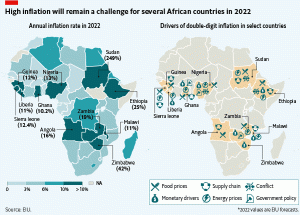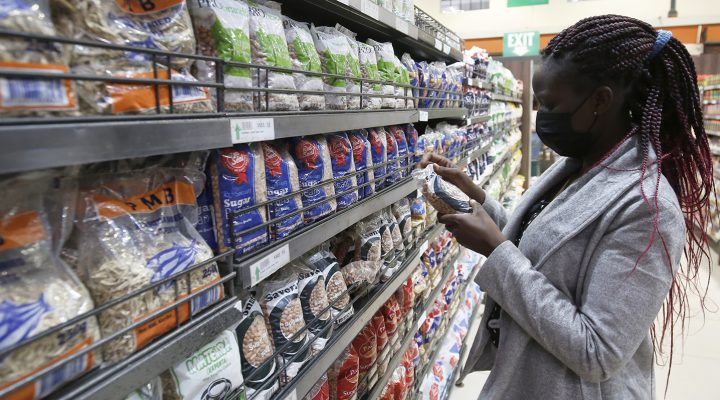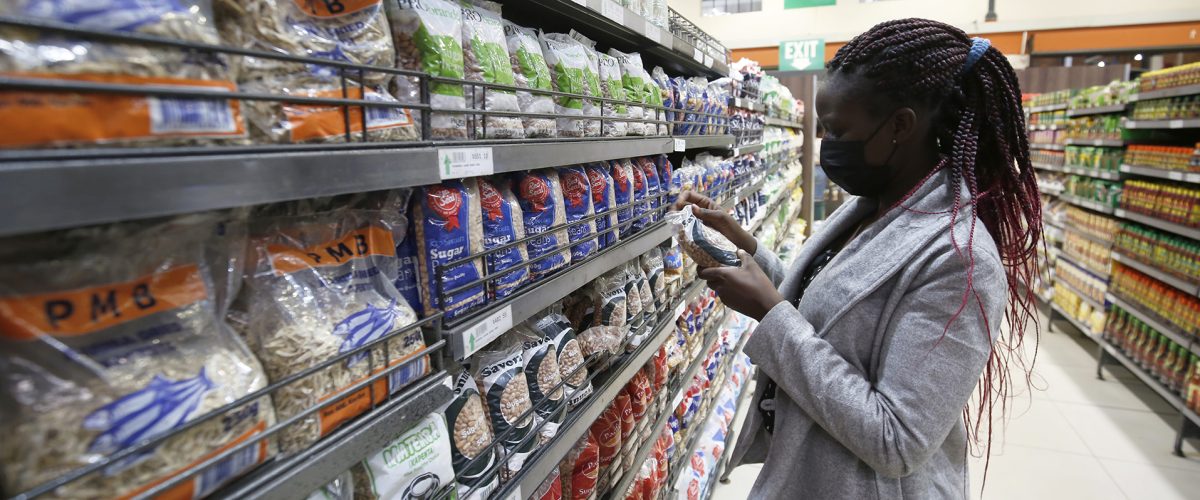While inflation troubles the United States and economies around the world, the rising cost of food and essential commodities is having a deadly effect across Africa.
The challenge on the African continent is not just about the rising cost of living but of food scarcity linked to adverse climate conditions such as drought and desertification. That’s compounded by insecurity caused by religious extremism and banditry that have killed or driven farmers from their lands, leading to low agricultural productivity.
The situation is further worsened by the combined effects of the COVID pandemic and the ongoing war in Ukraine that have increased the price of staples such as wheat, bread and gasoline. For these and other essentials, some African countries are import dependent, meaning there are no reliable supplies of certain goods apart from exports. This reality has been compounded by the unreliability of electrical service in some places, causing manufacturers to leave.
A historic food crisis
All this has sparked one of the worst, if not the worst, inflation and hunger crisis in the African continent in many decades.
“West Africa is hit by its worst food crisis in a decade, with 27 million people going hungry.”
“West Africa is hit by its worst food crisis in a decade, with 27 million people going hungry. This number could rise to 38 million this June — a new historic level and already an increase by more than a third over last year — unless urgent action is taken,” according to an April 2022 report by the United Nations Office for the Coordination of Humanitarian Affairs.
“Over the past decade, far from abating, food crises have been increasing across the West African region, including in Burkina Faso, Niger, Chad, Mali and Nigeria. Between 2015 and 2022, the number of people in need of emergency food assistance nearly quadrupled, from 7 to 27 million.”
 The escalating prices and scramble for food have caused panic and death in countries like Nigeria, where a recent food program by a church in Port Harcourt, in the southern part of the country, ended in tragedy May 28. More than 30 people died that day after a stampede broke out while they were waiting to receive free food at an event organized by King’s Church Assembly. Witnesses say the desperation by people to be in queue ahead of the event led to the disaster.
The escalating prices and scramble for food have caused panic and death in countries like Nigeria, where a recent food program by a church in Port Harcourt, in the southern part of the country, ended in tragedy May 28. More than 30 people died that day after a stampede broke out while they were waiting to receive free food at an event organized by King’s Church Assembly. Witnesses say the desperation by people to be in queue ahead of the event led to the disaster.
This tragedy brings to the fore the hunger many endure on a daily basis in Africa’s most populous country and biggest economy, Nigeria. While for some the challenge is the inability to buy food or goods at any cost, for others it’s the inability to afford items that are available but which now cost double or quadruple what they did just months ago.
Many sources feed the crisis
The Nigerian food crisis is caused by many factors, according to Sebastine Obasi, a Nigerian journalist who covers energy and business.
“Inflation has continued to take its toll on Nigerians since the beginning of 2022,” Obasi said. “It must be noted that this year’s inflation rate has not gone down well with the citizenry who are yet to be paid the minimum wage of N30,000, (about $73) more than one year after it was approved.”
In 2020 and 2021, the COVID pandemic brought untold hardship on the citizenry as farmers could not access their farms due to the restrictive nature of the pandemic and other factors worsened the situation, he explained.
“Nigeria has a peculiar problem. It is an import-dependent economy.”
“Nigeria has a peculiar problem. It is an import-dependent economy. Most of the items consumed in the country are imported. The manufacturing sector is in comatose. Moreover, a lot of the manufacturers have left the country due to the perennial irregular power supply. The negligible few companies that stayed back are compelled to produce at a very high cost. This is transferred to the consumers who finally bear the brunt.”
The Nigerian National Bureau of Statistics recently released a consumer price index that showed Nigeria’s headline inflation rate rose by 17.7% from last May to this May, Obasi noted. Specifically, the report’s food index continued on the upward climb to a 19.5% year-on-year increase. These increases were attributed mainly to increases in the price of bread and cereals, food products, potatoes, yam, wine, fish, meat and oil.
Government failure to address the crisis
Given the numbers, Obasi considers it regrettable that the government has failed to remedy the underlying problems that feed the dire situation. “For example, since the beginning of 2022, the national (electric) grid has collapsed not less than five times, thus putting manufacturers in a precarious situation. Worse still, the government at various levels have collapsed as attention is being focused on election as against the welfare of the citizenry.”

Maurice Olobo
Maurice Olobo, a senior lecturer in finance and risk management at Uganda Christian University, said the Ugandan government also has no answer to the rising cost of oil in the country.
“Uganda, just like any country in the eastern African region and Africa at large, is facing rising food prices. Uganda is predominantly an agricultural producing country,” he said. “In January, the Uganda Bureau of standards projected inflation to be at 2.1% in 2021. However, by June 2022, we saw it peak 6.1%. In the initial part of the year, as inflation was soaring in other parts of Africa, Uganda’s inflation was kept steady with minimal increments.”
Soon economic factors related to the global oil supply began biting Uganda’s fragile economy. Fuel prices doubled.
However, soon economic factors related to the global oil supply began biting Uganda’s fragile economy. Fuel prices doubled. “This has in turn driven inflation in other areas like food production,” Olobo explained.
In many of the 54 African countries — including South Africa, Zimbabwe, Kenya, Somalia and Cameroon — residents also have to grapple with inflationary trends.
“If prices are increasing faster than people’s nominal incomes, they will be able to afford fewer goods and services over time. The rise in inflation affects the purchasing power of people, which results in slowdown in economic activities and may translate to slower economic growth,” Olobo said.
The inflationary problems are particularly crucial on a continent with a high unemployment rate.
“Of Africa’s nearly 420 million youth aged 15 to 35, one-third are unemployed and discouraged, another third are vulnerably employed, and only one in six is in wage employment,” according to the African Development Bank. “Youth face roughly double the unemployment rate of adults, with significant variation by country. The problem is not just unemployment but underemployment, which peaks at just over half of youth in the labor force in low-income countries.”
‘What does Africa want from the world?’
Given the challenges many African countries currently face, there are some who argue the way out of the crisis is for African countries to stop importing goods from developed countries and focus on utilizing and promoting their own products and industries.
“I do not share this sentiment because Uganda and Africa at large is linked to the global economic system,” Oloba said in response.
For him, the solution is for Africa to develop long-term goals to tackle its myriad problems.: “What needs to be done as a continent is to have a long-term strategic vision for the continent.”
“What does Africa want from the world?” he asked. “This is a question we need to answer or else we shall always be caught in the middle of global issues where we have no stand. We need to invest in African identity. Once we see each other as one Africa and stop seeing one as Kenyan or Ugandan or Nigerian, we shall grow. African governments also need to (come up with) coordinated efforts to tackle food security on the continent rather than having a fragmented approach where each country focuses on its own. It is a pity that a country like Ukraine and Russia can go to war, and the entire African continent should (suffer) because … we cannot produce food to feed our own people.”
Anthony Akaeze is a Nigerian-born freelance journalist who currently lives in Houston. He covers Africa for BNG.
Related articles:
Nowhere near the war zone, Africans feel the heat of the Russia-Ukraine war in their pocketbooks
Pastors dabble in brewing and mining to survive Zimbabwe’s burning economy
As joblessness rocks South Africa, fake pastor diplomas are in demand


